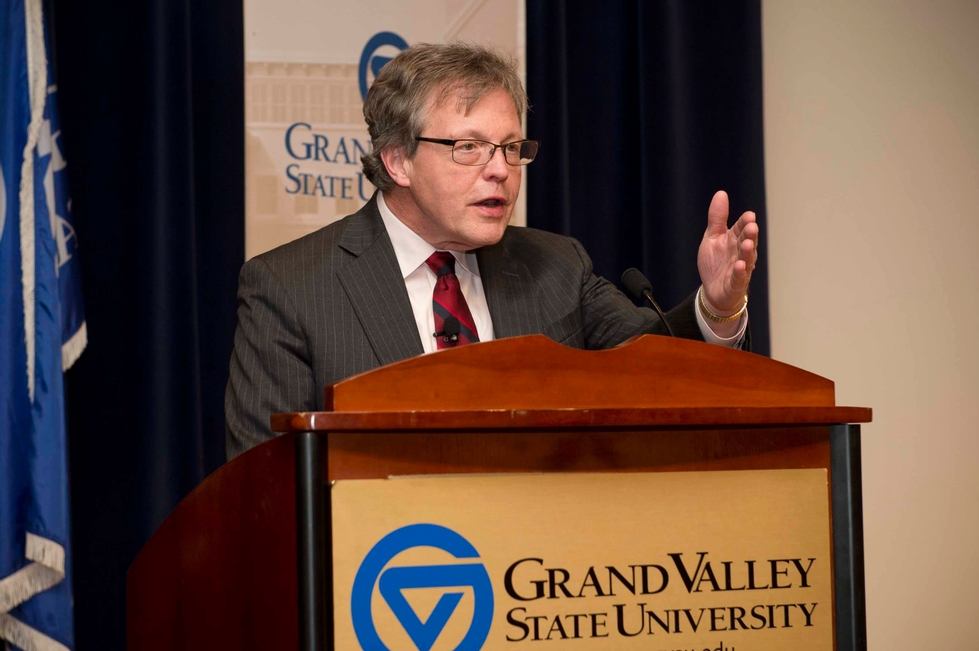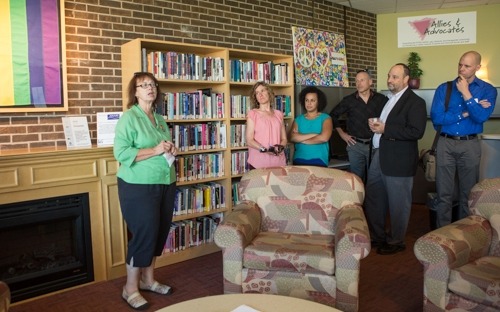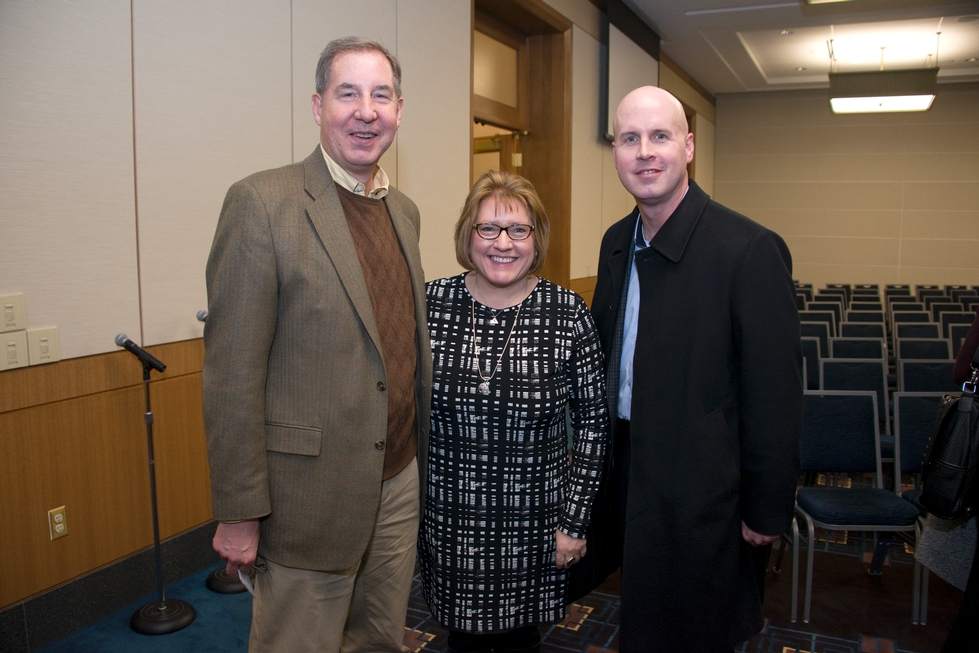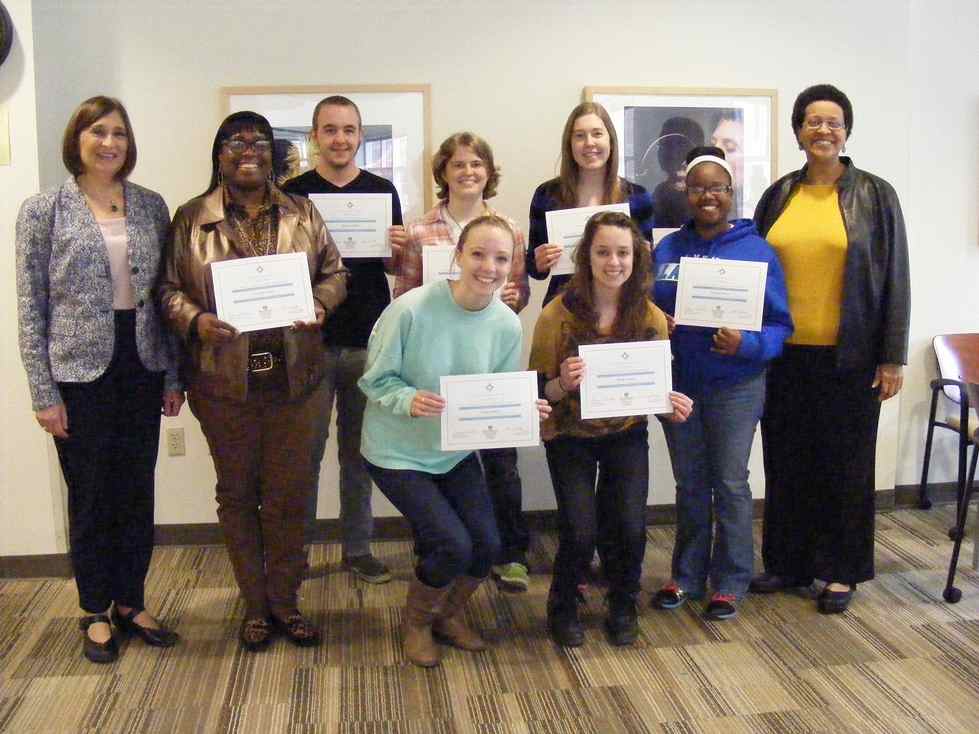Interdisciplinary Innovation
Inaugural Padnos/Sarosik Endowed Professorship of Civil Discourse
Lisa M. Perhamus was named the first faculty member to hold the Padnos/Sarosik Endowed Professorship of Civil Discourse. The endowed professorship is a gift to Grand Valley from longtime supporters Shelley Padnos and Carol Sarosik. They want students to understand civil discourse and have the skills to bring divergent views to the table with respect. Padnos chairs Grand Valley’s Board of Trustees.
Currently an assistant professor of education at GVSU, Perhamus has already begun planning for her new responsibilities in Fall 2014. As the Padnos/Sarosik Endowed Professor, she is tasked with developing a course and public symposium in civil discourse through the Brooks College of Interdisciplinary Studies, among other projects.
Her innovative course, Detroit’s Public Dialogues, will challenge students to not only learn about civil discourse, but also put it into practice. Perhamus said students will have the opportunity to participate in dialogues surrounding Detroit and travel there for community meetings where they’ll learn from city residents who are doing successful revitalization work.
Anne Hiskes, dean of the Brooks College, said members of the advisory board selected Perhamus largely because of her dynamic proposal.
“I can’t think of a more effective venue for involving students in meaningful conversations about poverty, race, government, and communities than the proposed student visits to Detroit,” Hiskes said.
The Padnos/Sarosik Endowed Professorship is an opportunity for students to gain new experiences in civil discourse through classroom and outside learning. Hiskes said Brooks College is the perfect home for the professorship.
“Our faculty members are known for connecting the classroom and the community,” she said. “We have many service-learning opportunities that integrate real world concerns. Interdisciplinarity, in its nature, requires understanding and integrating different perspectives.”
Hiskes added that over time, through curricular development and faculty professional development, this program will build institutional capacity to strengthen Grand Valley as a center of excellence in promoting civil discourse.
[1416499612].jpg)
Civil Discourse Means More Than Politeness
When talking about civil discourse, Jack Lessenberry said it means more than listening and speaking politely to others.
Lessenberry, senior political analyst for Michigan Radio, gave the inaugural lecture during the introduction of the Padnos/Sarosik Endowed Professorship of Civil Discourse on November 20 at the Richard M. DeVos Center.
He recalled a time when leaders in Washington or Lansing may have been on different sides of the aisle, but they cooperated and achieved legislation, calling the other side the opposition.
“We now seem to regard the opposition as the enemy,” he said.
Lessenberry projected that the tide shifted to anger after the collapse of the former Soviet Union, in the late 1980s and early ’90s.
“For a half-century, the U.S. defined itself in relations to the Soviet Union. We were not them,” he said. After the end of the Cold War, Lessenberry said, “We were alone … and the United States were not united.”
The event also introduced the first faculty member to hold the professorship: Lisa M. Perhamus, assistant professor of education. The endowed professorship was a gift to Grand Valley from longtime supporters Shelley Padnos and Carol Sarosik. Padnos chairs Grand Valley’s Board of Trustees.

Center for Adult and Continuing Studies
Grand Valley leaders say the new name for Continuing Education puts an emphasis on service to current and prospective students.
The new name — Center for Adult and Continuing Studies — was announced at the November 1 Board of Trustees meeting. Anne Hiskes, dean of the Brooks College of Interdisciplinary Studies, said the name change reflects Grand Valley’s ongoing commitment to student success. “The name change signals our commitment to remaining current and relevant in providing innovative and flexible programming that meets the evolving needs and interests of community members and the West Michigan region,” Hiskes said.
Simone Jonaitis, executive director of the center, said the new name provides a more accurate description of the services provided at the center, which range from degree completion to
professional development to community engagement.
“In addition to providing an umbrella for all of our programs and services, it is a visible illustration of Grand Valley’s commitment to the nontraditional student,” Jonaitis said. About one-fourth of Grand Valley’s students are nontraditional, which generally means students who are over age 23, or are veterans, or returning adult students.
Learn more about the center at gvsu.edu/learn/.
New Liberal Studies Leadership Program for Adults
The launch of a new degree program for working adults shows that Grand Valley is meeting the needs of nontraditional students in an innovative way.
The Center for Adult and Continuing Studies (CACS) has started recruiting students for a cohort in the Liberal Studies Leadership program, a 19-month accelerated degree program.
Simone Jonaitis, executive director of the CACS, said the program will meet the needs of working adults and their employers.
“People with strong theoretical knowledge and practical experience in leadership are needed in today’s workforce,” Jonaitis said. “This program will focus on helping students develop the skills needed to advance in jobs or pursue new careers.”
Leadership studies provides an opportunity for students to enhance current skills and build new capacities.
The new leadership program will start in the Fall 2014 semester. Qualified students will take one five-week class at a time. Students who will best qualify will have earned about 72 credits, are at least 24 years old with two or more years of work experience, and are highly motivated.
Judy Whipps, professor of Liberal Studies and Philosophy, helped develop the program’s course content. She said the program will give adult learners practical skills and engage them in the “reflective practice that is at the core of liberal education.” Whipps added that leadership studies fulfills those two goals.
“Leadership studies provides an opportunity for students to enhance current skills and build new capacities; it also is flexible enough to apply to many different fields of work,” she said.
The CACS piloted a similar Liberal Studies degree program with an emphasis on leadership at the Muskegon Center three years ago. Whipps said that the pilot program enabled faculty and staff members to determine which courses best suited the needs of adult learners.
More details on this program can be found at www.gvsu.edu/learn/.
New LGBTQ Studies Minor
In April 2013, the Board of Trustees approved the LGBTQ Studies minor. A reception to remember the past and celebrate the new minor took place on September 9.
The minor is an integrative, interdisciplinary program that examines issues and debates about sexuality and gender. Engaging in the analysis of intersections of sexuality and gender with race, class, and national identity, LGBTQ Studies equips students with strong critical thinking, writing, and leadership skills.
Anne Hiskes, dean of the Brooks College of Interdisciplinary Studies, said “the minor embodies the liberal education mission of Grand Valley by promoting critical thinking and innovative collaborations with campus departments like the Women’s Center and LGBT Resource Center and community partners.”
Learn about this new program at www.gvsu.edu/lgbtq/.

Knowledge Market Contributes to Increases in Writing Center Consultations
The first-year report on the Knowledge Market in the Mary Idema Pew Library Learning and Information Commons showed students were enthusiastic supporters of the “one-stop shop” for consultations with research, writing, and speech preparation.
Patrick Johnson, assistant director of the Fred Meijer Center for Writing and Michigan Authors, said exit surveys showed students liked the Knowledge Market’s location, received quality feedback on par with other writing center locations, and enjoyed the ease of going to a central space for assistance with a variety of projects.
During the 2013-2014 academic year, there were more than 12,700 consultations by Writing Center consultants. The Knowledge Market saw 4,000 consultations, accounting for about 30 percent of all Writing Center consultations.
IBM Vice President Speaks at Frederik Meijer Lecture
An IBM vice president drew on her 30-year career in information technology and international business to provide insights on leadership to students, faculty members, and staff members during the Frederik Meijer Lecture Series. Mary Coucher, vice president of intellectual property management for IBM, spoke on February 24 at the L. William Seidman Center. Coucher is responsible for IBM’s patent technology and licensing, engineering, geography business development, and financial operations.
In the lecture facilitated by Bill Holsinger-Robinson,Frederik Meijer Endowed Honors Chair of Entrepreneurship and Innovation, Coucher emphasized the importance of a liberal arts education and the benefits of having a wide range of knowledge. During the lecture, Coucher also discussed her time spent in Japan where she was relocated for work. She explained the difficulties of adapting to a new culture and how it is important to take the time to learn another culture’s norms and language, no matter where you are.
The Frederik Meijer Lecture series was established by a gift from the Meijer Foundation to provide local and national presentations that focus on issues of leadership, innovation, and entrepreneurship from the perspective of students, faculty members, and participants in business throughout the region.

2014 Intercultural Training Certificate Cohort
The Intercultural Training Certificate (ITC) was established in 2011. Designed to complement any major at Grand Valley, the certification requires of students only a few extra classes, including a practicum in which students immerse themselves in a culture different from their own.
Regina McClinton, director of the ITC, said the program is designed to give students the skills to interact sensitively and effectively with the rich diversity of people in our increasingly global community.

